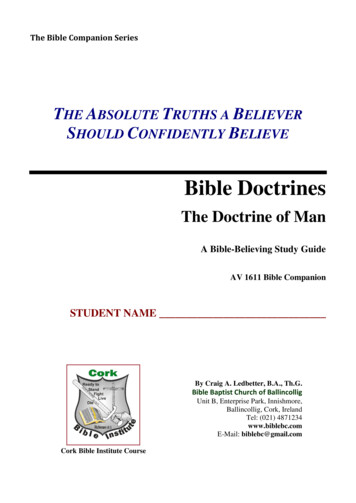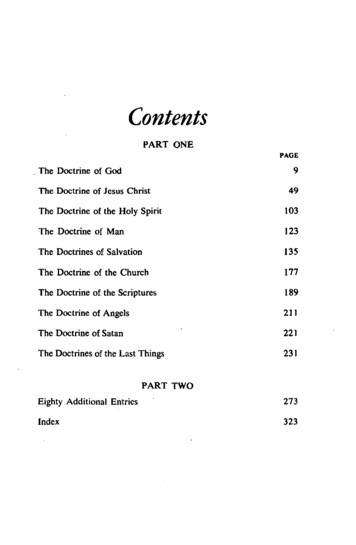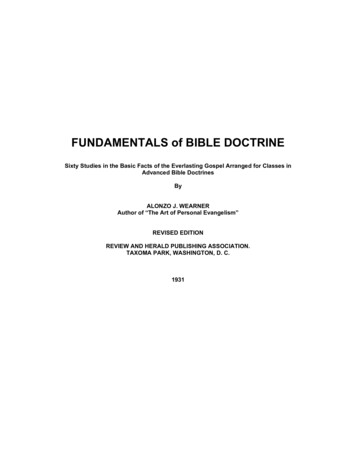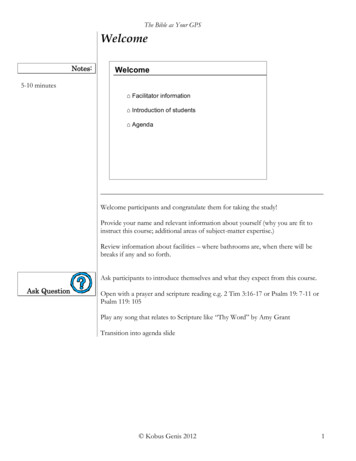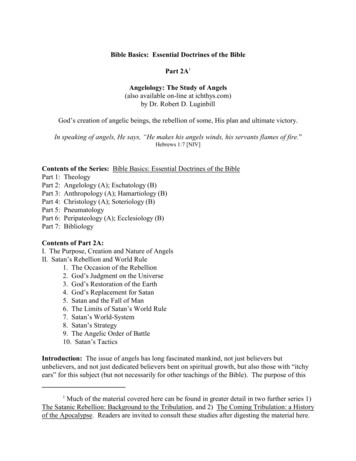
Transcription
Bible Basics: Essential Doctrines of the BiblePart 2A1Angelology: The Study of Angels(also available on-line at ichthys.com)by Dr. Robert D. LuginbillGod’s creation of angelic beings, the rebellion of some, His plan and ultimate victory.In speaking of angels, He says, “He makes his angels winds, his servants flames of fire.”Hebrews 1:7 [NIV]Contents of the Series: Bible Basics: Essential Doctrines of the BiblePart 1: TheologyPart 2: Angelology (A); Eschatology (B)Part 3: Anthropology (A); Hamartiology (B)Part 4: Christology (A); Soteriology (B)Part 5: PneumatologyPart 6: Peripateology (A); Ecclesiology (B)Part 7: BibliologyContents of Part 2A:I. The Purpose, Creation and Nature of AngelsII. Satan’s Rebellion and World Rule1. The Occasion of the Rebellion2. God’s Judgment on the Universe3. God’s Restoration of the Earth4. God’s Replacement for Satan5. Satan and the Fall of Man6. The Limits of Satan’s World Rule7. Satan’s World-System8. Satan’s Strategy9. The Angelic Order of Battle10. Satan’s TacticsIntroduction: The issue of angels has long fascinated mankind, not just believers butunbelievers, and not just dedicated believers bent on spiritual growth, but also those with “itchyears” for this subject (but not necessarily for other teachings of the Bible). The purpose of this1Much of the material covered here can be found in greater detail in two further series 1)The Satanic Rebellion: Background to the Tribulation, and 2) The Coming Tribulation: a Historyof the Apocalypse. Readers are invited to consult these studies after digesting the material here.
study is to give an essential overview of what God would have us to know about angels basedupon what is actually contained in His Word.I. The Purpose, Creation and Nature of Angels1. The Purpose of Angels:1) God, the Creator, existed before His creation (Jn.1:1-3). It is important to rememberthat angels, for all their temporary superiority to mankind, are creatures too. God, the Creator ofthe universe, of time and of space, existed (and exists) before the universe and outside of it.Angels, on the other hand, as creatures, can only exist within the creation, and are, therefore,subject to time and space. Though their capabilities currently surpass those of human beings,they are still “fellow servants” of God, and subordinate to Him in every way (Rev.19:10; 22:9).Before the mountains were born, or you gave birth to the earth and world,from everlasting to everlasting, you are God.Psalm 90:22) God was self-sufficient before He created the universe, and is so now (Is.40:21-26).God did not “need” to create the universe, or angels, or mankind, or anything, for that matter. Heis perfect and has no needs whatsoever. This was true before His first act of creation, andremains and will remain so throughout the course of creature history and into eternity.God, who created the universe and everything in it, even He who is Lord of heaven andearth, does not dwell in temples our hands have made, nor is He ministered to by thehands of men (as if He needed anything from us) – [on the contrary], He is the One whogives life and breath and everything else to us all. Acts 17:24-253) God’s purpose in creating angels and mankind is for His glory and our good (Is.43:7;Eph.1:5-6; 1:11-12). God is the Potter, and all we His creatures are the clay, created for thepraise of His glory, and His glory we shall praise on that day of eternity and forevermore(Is.29:16; 45:9; 64:8; Jer.18:4-6; Rom.9:21).But now, O Lord, thou art our father; we are the clay, and thou our potter, and we all arethe work of thy hand.Isaiah 64:8 [KJV]This is true not only of His creatures who respond to Him and follow Him and His Son, but alsofor those who have rejected His authority and His Son (Rm.14:11; Phil.2:10-11):By Myself I have sworn. From my mouth a righteous word has gone forth, which will notbe revoked, that every knee will bow to Me, and to Me every tongue will swear. And sothey will acknowledge Me: “Only in the Lord are righteousness and might.” Before Himwill come all who raged against Him and they will be put to shame. Isaiah 45:23-242
Moreover, angels and mankind alike will praise Him for all His marvelous deeds on our behalf,for He is glorified by blessing us. This is the God with whom we have to do!To Him who sits on the throne and to the Lamb, be praise and honor and glory and powerfor ever and ever!Revelation 5:13b [NIV]2. The Creation of Angels:At some undisclosed time following His creation of the heavens and the earth, God created theangels (Ps.148:2-5; Col.1:16). This event took place after the original ex nihilo (i.e., “out ofnothing”) creation of the universe described Genesis 1:1, and before the restoration of the earth(described also at Job 38:4-7) which followed God’s initial judgment upon the universe becauseof Satan’s rebellion (the results of which are described in Genesis 1:2 and following). Godcreated all angelic kind at this time (including Satan and all those who would eventually rebelagainst Him). Though some would come to choose against Him, all the angels were originallycreated holy (Deut.33:2; Ps.89:7; Mk.8:38; Lk.9:26). God gave each of them distinct duties anddefinite domains in which to exercise specified authority delegated by Him (Col.1:16; Eph.6:12;Heb.1:7 & 14; Jude 6).3. The Nature of Angels:1) Angels are finite beings: As created beings, angels are dependent upon time and space.Though more powerful (2Thes.1:7; 2Pet.2:11), mobile (Gen.28:12) and knowledgeable(2Sam.14:20) than mankind, they are neither omniscient (Matt.24:36), nor omnipotent(Rom.8:38), nor omnipresent (Dan.10:13).2) Angels are finite in number: Angels are often described as the “host of heaven” andotherwise compared to the innumerable stars (e.g., Job 25:3; Ps.103:20-21; Is.40:26 withLk.2:13), but although they are a highly organized group and quite numerous, it should beunderstood that they are not infinite in number, however large that undisclosed number may be(Deut.33:2; Ps.68:17; Dan.7:10; Heb.12:22; Rev.5:11). Further, angels are not subject to death(Lk.20:36), nor do they reproduce (Mk.12:25), leading us to the conclusion that their number hasbeen the same since their collective creation.3) Angels are different from human beings in significant respects: Unlike human beings,angels do not grow old, or hungry or tired. Angels are thus not subject to many of the moreobvious material restraints that limit human activity and are, for the most part, completelyinvisible to us. However, angels can at times appear in bodily form (as in the case of theannouncement of Christ’s birth: Lk.2:8-15), and can also affect the material world with greatpower (consider the angels who control the winds: Rev.7:1-3).3
4) Angels are similar to human beings in significant respects: Like human beings, angelspossess personality and individuality (as evidenced, for example, by joy: Job 38:4-7; Lk.15:10;desire: 1Pet.1:12; and choice: Jude 6). And like us, they are created to serve and worship Godfor His glory (Ps.103:20-21; 148:2; Matt.4:11; Heb.1:14; Rev.4:8).5) Angels are temporarily superior to mankind: In terms of power and ability, the presentangelic superiority to mankind is obvious in every passage of scripture in which they aredescribed. This current angelic superiority significantly also extends to the area of longevity.While mankind is enjoying a sequential residence on earth (generation following generation),angelic kind has been experiencing a continuum of existence in heaven, even before the creationof Man. This longevity, combined with the fact that angels (though creatures like Man) are notsubject to the same degree to the restraints and necessities of time and space that encumbermankind, undoubtedly contributes to their superior knowledge and wisdom as well. By its veryessence, therefore, the angelic nature is superior to our present earthly human nature in terms ofappearance, intellect, power, mobility and authority (2Pet.2:11).6) Angels will ultimately be inferior to mankind: Angels will not always be superior tomankind. Just as our Lord’s humanity is, in resurrection, superior to angels in every way(Heb.1:4 - 2:18), so also we are destined to share that superiority with Him in our resurrection(1Cor.6:3; Heb.2:5).7) Angels are acutely aware of and involved in human affairs: The involvement ofangelic beings in human affairs is part and parcel of their role in promoting (or, in the case of thefallen angels, opposing) God’s plan for human history (see “Satan’s Rebellion” immediatelybelow). On a more personal level, however, angels are also apparently extremely interested inobserving human behavior in general and in the playing out of God’s plan in particular(1Tim.3:16; 5:21; 1Pet.1:10-12). This is particularly true in the case of the Son of Man, our LordJesus Christ. They were present at His birth (Lk.2:13-14), temptation (Matt.4:11), resurrection(Lk.24:4), ascension (Acts 1:10-11), and return (2Thes.1:7), evidence which underscores angelicinterest in the most crucial phase of God’s plan, namely the life and work of the Messiah. Byobservation, angels are learning (to their joy in the case of the elect angels, to their sorrow in thecase of the fallen angels) about the wisdom, the power, the grace and the mercy of God (cf.Lk.15:10; 1Cor.4:9; 11:10).8) Angels should neither be worshiped nor disrespected: In any discussion of angels, it isimportant to keep in mind both their present superiority and their eventual subordination to us.Angels are not to be disrespected (Lk.10:20; 2Pet.2:10-12; Jude 8-10; cf. Rom.13:7), but neitherare they to be worshiped (Rev.19:10; 22:9; cf. 2Kng.17:16; Jer.19:13; Col.2:18). This isespecially important in regard to fallen angels. God counterbalances their evil efforts with thework and ministrations of His holy, elect angels. Therefore, although we are to have a healthyrespect for the Adversary and his potential to oppose us (2Cor.2:11; Eph.6:11; 1Pet.5:8), we arenot to be unduly terrified by him and his minions. And while we are to have an awareness andappreciation for the positive function of the elect angels on our behalf, we are not to be4
inordinately fixated upon them (especially since both their persons and their work are invisible tous). In neither case should we “go beyond what is written” in the Bible about angels, whetherthrough excessive fear of Satanic influence or an exorbitant fascination with the ministrations ofthe holy angels.II. Satan’s Rebellion and World RuleThe rebellion of the devil and his angels against God is a most important subject in theconsideration of eschatology, the biblical study of the events of the end times. This is becauseSatan’s rebellion is central to the whole course of human history as well as to God’s finalresolution of history, beginning with the Tribulation. Mankind is, in many ways, God’s responseto the devil, and the devil’s repeated attempts to destroy mankind are, necessarily, connectedinextricably with God’s plan to defeat Satan through the agency of mankind (in the Person of HisSon). It is therefore not too bold a statement to say that it is impossible to understand humanhistory, from the divine point of view at any rate, without taking into consideration the satanicrebellion and the role mankind plays in God’s response to it.1. The Occasion of the Rebellion:1) Satan’s original status: Satan was originally the top ranking angelic creature endowedwith extraordinary honors. He preeminently reflected the glory of God as “Lucifer” (Is.14:12);he was the very model of symmetry (Ezek.28:12); he was blessed with the greatest wisdom(Ezek.28:12); he was adorned with magnificent paraphernalia (Ezek.28:13); he was, in short, the“anointed cherub”, entrusted with the highest angelic responsibility and in highest position ofhonor (Ezek.28:14).2) Satan’s Character: Contrary to much popular opinion, the devil was not created evil.Indeed, God created Satan “blameless”, as Ezekiel 28:15 tells us. This is a critical piece ofinformation, because through this scripture we are assured that the devil’s decision to sin was notsome inevitable action originating with God, but was instead a free-will decision on Satan’s part.Satan was created without sin, and with no necessity to sin. He and he alone is the one whobears the complete responsibility for all the trouble he has brought upon his fellow angels, uponhumanity, and upon himself. God bears none of the blame for Satan’s fall. Satan took theopportunity of using the free will God gave him to reject God and follow instead the path of evil.3) Satan’s Sin: In his instructions to Timothy regarding the essential qualifications ofpastors, Paul concludes by warning that the potential candidate should not be a neophyte (i.e.,one new to the faith and spiritually immature). Otherwise, Paul says, such a person might easily“become puffed up” (i.e., blinded by arrogance) “and so fall into [the same] condemnation as thedevil [did]” (1Tim.3:6). In Paul’s caveat, pride, that is, an unwarranted sense of superiority,when indulged creates a breeding ground for further sin. This was certainly so in Satan’s case.The devil’s exorbitant pride over the qualities and attributes given him by God (Ezek.28.17) was5
allowed to corrupt his entire thought process and led in turn to his plotting against God (Is.14:1314; Ezek.28:17b). The eventual result was a full scale rebellion. The substance of Satan’scorrupt thinking, a sinful pattern of thought which (as is so often the case) inevitably resulted insinful action, is recorded for us by Isaiah:For you said in your heart, “I will ascend heavenward. I will set my throne above thestars of God. And I will take my seat on the mount of assembly on the sides of the north.I will ascend above the heights of the clouds. I will be like the Most High God.Isaiah 14:13-144) Satan’s Fall: Ezekiel 28:15-18 describes the process by which the devil put hisarrogant plan into practice, tracing the matter backward at first from the result to the cause:In all your ways you were perfect from the day of your creation until unrighteousness wasfound in you. In your extensive conspiring, you were filled with wickedness, and yousinned. So I cast you from the mountain of God as one profaned, and I blotted out [yourmemory] from among the stones of fire, O covering cherub. Your heart became haughtybecause of your beauty, [and so] you destroyed your wisdom on account of your splendor.So I cast you to the earth, and I made a spectacle of you before kings. In the abundance ofyour iniquity, in the unrighteousness of your conspiring, you profaned the sacred placesentrusted to you, so I made fire come out of your midst which devoured you, and I madeyou like the dust of the earth in the eyes of all who beheld you.Ezekiel 28:15-18Arrogant pride, attributed specifically to Satan’s high esteem for his own appearance, is at theroot of the thought pattern described in Isaiah’s five “I wills” (Is.14:13-14; see above). Persistentand obsessive preoccupation with his own loveliness over time had a corrupting influence uponSatan’s whole mental attitude, neutralizing, then effectively destroying his conscience, hischaracter and his wholesome fear of God (cf. Eph.4:19; 1Tim.4:2). This arrogance led to acomplete perversion of the devil’s thought process, and these mental attitude sins blossomed intoovert activity; specifically, they led to the canvassing of his fellow angels for support in rebellingagainst the Lord (i.e., “your extensive conspiring” and “the unrighteousness of your conspiring”).The judgments described here are largely yet future, but, since the devil’s fate is certain (since ithas been decreed by God), they can be described as already having taken place.5) Satan’s Coup d’État: As would-be usurper of God’s throne, Satan found himself in adelicate position. When he conceived his nefarious ambition, he was on his own. Even in hisunparalleled arrogance, he realized that he would need help if he were to be successful in hisattempt to dethrone the Lord of the universe. Satan did have some advantages. As thepreeminent and highest ranking angelic creature (not to mention the most impressive), the devilhad considerable influence and authority over the other angels. None would be likely to rebelfrom the Lord instantaneously on Satan’s say-so, but, with proper preparation, it might bepossible to sway some of his fellows. The devil’s plan was not to overthrow God by force (forsuch a course of action was a complete impossibility, as even Satan with his inflated sense of selfsaw clearly enough), but rather to effect a coup d’état. By winning over the allegiance of the6
angels, Satan thought to present God with a fait accompli which He would be powerless toreverse. For if the angels were to choose Satan over God, the devil seems to have felt secure thatthis fact in itself would protect him from divine retribution.It is evident from the events that followed the conception of his plan that the devil was indeedable to bring a large proportion of angels (one third in fact: cf. Rev.12:4) over to his way ofthinking about God’s probable reaction to any such coup d’état (an appropriate name for anoverthrow of authority based not upon a contest of relative force, but rather upon politicalintrigue). For before any of the angels followed him, they would need to be convinced of theprospects of success: had they instead been certain of swift retribution from the Lord Almighty,it is fair to ask how many would have voluntarily enlisted into Satan’s cause. There had to besomething more, however. Satan’s own motive of universal rulership is clear enough, but hispotential followers would have to be wooed. Paradise, after all, could not have been so terribleas to force them into rebellion against God for its own sake, and the obvious fact that, in spite ofSatan’s assurances, at least some element of risk would be involved in betraying God could nothave been lost on them. Satan needed a platform, one persuasive enough to convince hiscontemporaries to throw in their lot with him and take the risk of eternal condemnation.6) Satan’s Platform: This necessity of a positive platform, a goal that could tempt hisaudience and incite their lust, was even more important than convincing his would-be followersthat rebellion against God would be safe and meet with success. But what do angels lack, andwhat could they possibly want that it is not lawful for them to have? Angels are not affected bythe elements, as we are, not plagued by disease or the ravages of time, not in any needwhatsoever that might incite the lust for acquisition that so inflames mankind. Yet it is preciselyin that fact which liberates the angels from all the cares and concerns we humans feel sointensely that Satan found his chief selling point, the prime inducement to his fellow spiritcreatures to gamble their eternal futures and bind their fate to Satan’s forevermore: namely, theirlack of a physical body.While we humans possess both a spiritual and a material part, angels, are primarily spiritualcreatures. The absence of true corporeality such as we humans possess is in many respects ablessing for it spares the angels the pain, suffering and tears which are the common heritage ofmankind since the fall. But this lack of corporeality seems to have left many of the angelswondering what might have been as they observed the animal life of the original earth prior to itscataclysmic destruction as a result of Satan’s rebellion (and subsequent restoration during theseven Genesis days).From everything we know about the angels from scripture, possession on their part of animalsand of humans is contrary to the will and the law of God in every way. Satan observed thecuriosity and interest of his fellows towards corporeal sensuality and applied the universalprinciple of sinful motivation treated above: they didn’t have bodies and, moreover, wereforbidden to possess the bodies of other creatures; therefore they wanted them, wanted toexperience first hand the sensual, corporeal life “that had been denied them” (according to7
satanic propaganda). Clearly, God was not going to stand by and allow a wave of possessionscontrary to His commands (much less any program of breeding and genetic manipulation thatmay be evidenced by the hominid portion of the fossil record). The only way to “escape” therather pure spirituality God had “inflicted” on them was to fall in behind a new leader and takewhat they wanted in defiance of God.God rained down complete destruction on the world of that time, but it is interesting to note thatthere are a number of biblical passages which demonstrate that the lust of the devil’s followersfor bodies which most approximate their own essential shape is still very much alive:1. Angels have no strictly material bodies of their own: Without takingpossession of the bodies of other creatures, angels are unable to fully experience the materialworld in any sensual way. Paul’s list of “bodies” in 1st Corinthians chapter fifteen mentions“heavenly bodies”, but by this he clearly means the planets. Significantly, he does not mentionangels. Many passages stress the spiritual (and hence non-material) nature of angels (Heb.1:7;1:14; 2:14-16 [esp. v.16]). This radical difference from human (and animal) kind helps toexplain how angels are occasionally called “gods” (i.e., having more in common with thespirituality of God than the materiality of Man: Ps.8:5; 82:1 & 6). Angels are not “flesh andblood” as we, in our material part, clearly are (Eph.6:12). When our resurrected Lord appearedto His disciples and was taken for a ghost, He commanded them to “touch Me and see that aspirit (pneuma) does not have flesh and bones as you see Me having” (Lk.24:39). The word Heused, the Greek pneuma (pneuma), is the same word used for angels wherever they are deemed“spirits” (e.g., Heb.1:7 & 14). No stronger confirmation could be asked to show that angels aredifferent from us in this main, crucial point of corporeality (and, therefore, in the enjoyment ofall that is sensual).2. The Serpent of Genesis 3: It is no accident that when we first encounter Satanin scripture, he has taken possession of a material creature, the serpent. We can assume from thecontext that this especially “subtle” creature was Eve’s special pet, and a perfect vehicle for thedevil’s seduction. But was his possession of the creature necessary to accomplish his goal (anymore than his possession of Judas was: cf. Lk.22:3)? What we can say is that possession of thebodies of material creatures is part of Satan’s normal modus operandi, and indicates that this ismore than something the fallen angels “have to do” to accomplish their nefarious purposes.Rather, it is something they dearly desire to do.3. The Angelic Infiltration of Genesis 6: As both Jude 6 and 2nd Peter 2:4 makeclear, “the sons of God coming in to [mate with] the daughters of men” was a Satanic attack ofimmense proportions which violated God’s ground rules for the resolution of the angelicrebellion in human history. The direct mixing of angelic and human seed is clear-cut proof of thedesire on the part of Satan and his followers to attain the (for them) unattainable: corporeality.4. The Legion of Demons and the Swine: In Mark chapter 5, when Jesus cast thedemon legion from a single man, these fallen spirits “begged” Him to “send us among the pigs;8
allow us to go into them” (v.12). There is very little to explain their motivation for this requestuntil we accept that these satanic angels, being deprived of their human home, were desperate toregain some material abode, be it ever so mean.5. The Wandering Spirit (Lk.11:24-26): The return of the “wandering spirit” tothe man he had previously possessed is a likewise telling case that only fully makes sense whenwe take into account the “addiction” the fallen angels have to the corporeality which, as part ofour nature, we understandably take for granted. The demon goes through desolate places seeking“rest” (i.e., another willing subject to inhabit), but when it is disappointed in this hope, it returnsto its “house” (Greek oikos). The terminology used here is significant, for in 2nd Corinthians 5:2,Paul calls our coming resurrection body, the super-material home in which we shall spend alleternity with the Lord, a “dear-house from on high” (Greek oiketerion, the diminutive of the veryword used for house above being used in a [grammatically] familiar sense). Our material abodes,the bodies that house our spirits both now and then, are given to us by God, but it is the devil’splan, and his prime inducement to his followers, to take by force the homes that properly belongto others.Satan’s false gospel to the angels who fell with him was one of “deliverance” from their nonsensual state. He found them curious about the experience of material existence, and inflamedthis curiosity into outright lust and rebellion, so that they became obsessed with the possession ofmaterial bodies, and addicted to the experience (in the same way that many of our fellow humanbeings are destroyed by drugs). Therefore, the widespread and dishonest trade of Ezekiel 28:16& 18 is better translated “canvassing” or “campaigning”. Satan found his issue and seduced alarge part of angelic kind with it.2. God’s Judgment on the Universe:Scripture neither mentions nor records the length of the interval between God’s confrontation ofSatan’s coup and His judgment upon the primeval world, but it is entirely possible that thisperiod was aeons long in human terms. Such a grace interval would demonstrate beyond anyshadow of a doubt who had chosen for God and who for Satan, as the devil commenced hisearthly reign over what had been the original paradise, the original “Eden” (i.e., the pre-Adamicearth). Given the demons’ longing for physical bodies and the integral part in Satan’s plan thatthe satisfaction of that desire played, it is not unreasonable to suppose that much of thefascinating fossil record we now possess from that archaic earth is a result of the devil’smanipulation and misuse of earth’s original fauna for just such purposes: the Bible’sidentification of Satan with reptiles (dragons, serpents), and his obvious fascination with thesame (cf. Gen.3), make the possibility of this theoretical satanic origin of the terrible, powerfulcreatures of pre-history all the more conceivable.Eventually, earth came to bear no resemblance to the primal paradise the Lord had created exnihilo, and when no further purpose would be served by additional delay, but, to the contrary, thedevil and his angels had emphatically confirmed their evil and rebellious intentions, God9
Almighty executed an awesome judgment upon the pre-historic earth. By delaying judgment, Hehad demonstrated to all angelic creation how pitifully inadequate Satan’s efforts were, howhollow his promises, how tyrannical his rule. Now was the time to put an end to the devil’s“experiments”, to turn out the lights in the universe, and to leave the adversary and his followersto contemplate in terror what God would do next. In a terrifying judgment, all life on earth wasannihilated and the universe, originally resplendent and luminiferous, plunged into utter darkness(an event which must have been incredibly traumatic for all the angels, creatures of light that theyare). This entire period of prehistoric angelic existence, the devil’s revolt and first earthly reign,and God’s subsequent judgment upon the earth are summarized in a mere two verses in the bookof Genesis, or, more correctly stated, fall into the “gap” between Genesis 1:1 (which speaks ofthe original creation) and Genesis 1:2 (which describes the earth subsequent to judgment andprior to the seven days of re-creation):Before all else, God created the heavens and the earth [original creation]. But the earthcame to be ruined and despoiled – darkness lay upon the face of the abyss while God’sSpirit brooded over the surface of its waters [all as a result of God’s judgment in responseto the devil’s revolt].Genesis 1:1-2The ruination and destruction of the earth under Satan’s pre-historic rule is aptly described by theHebrew phrase tohu wa-bhohu (i.e., “ruined and despoiled”: vhbv vht). Many creative (andmisleading) translations have been offered in an effort to remove the difficulties caused by aliteral translation of this phrase. For the description of earth in this devastated condition causesobvious problems for the summary-statement interpretation of verse one: how and when couldthe earth have been so ravaged if no gap is to be understood between verses one and two?Moreover, the words tohu and bhohu always refer to “emptiness”, “uselessness” or,“worthlessness”, that is to say, a confused, chaotic state, inevitably the result of some cataclysm,and usually one that has been brought on by divine judgment (cf. Deut. 32:10; 1Sam.12:21; Job6:18; 12:24; 26:7; Ps.107:40; Is.40:17; 41:29; 44:9; 45:19; 49:4; 59:4). Finally, the state of theearth in Genesis 1:2 described as in “darkness” is really only understandable when a judgment ofthis sort is assumed to be the source of the darkness. For God is a God of light (1Jn.1:5), andeverything He creates is perfect, while darkness is synonymous with evil (Eph.5:11; 6:12;1Jn.1:6; 2:11), and is a characteristic result of divine judgment (Is.5:30; 8:22; Ezek.32:7-8; Acts13:11).3. God’s Restoration of the Earth:While Genesis 1:1 thus describes the original, ex nihilo creation of the universe, the second verseof the Bible, Genesis 1:2, split grammatically from verse one with an abrupt, adversativeconstruction (in the Hebrew), propels us untold eons forward in time from the original, awesomeact of creation, and moves us to the other side of the Genesis gap, describing for us the state ofthe universe as it existed before God re-created the earth.10
Original creation had been marred by Satan’s revolt, and cast into darkness by
fallen angels, opposing) God’s plan for human history (see “Satan’s Rebellion” immediately below). On a more personal level, however, angels are also apparently extremely interested in observing human behavior in general and in the playing out of
